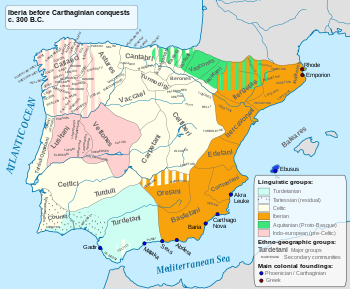Bastetani



The Bastetani or Bastuli were an ancient Iberian (pre-Roman) people of the Iberian Peninsula (the Roman Hispania). They are believed to have spoken the Iberian language.[1] The relationship between the Iberian Bastetani and the Tartessian Mastieni (who lived in Mastia, on the southeastern coast of the peninsula) is not entirely clear.[2][3]
Their territory Bastetania [1] extended through the southeastern Iberian Peninsula, which currently encompasses southern Albacete, Almería, Granada, eastern Málaga, southeastern Jaén and western Murcia. Their main towns were located between Baria (present-day Villaricos) and Bailo (Cádiz), also including Malaka, Abdera, Sexi and Carteia.[3] Their capital was probably the city known as Basti by the Romans, which corresponds to present-day Baza.[3] The Lady of Baza, a famous Bastetani sculpture, was recovered from the necropolis of Basti in 1971.
See also
[edit]References
[edit]- ^ Roman Archaeology Conference (1st : 1995 : University of Reading); Keay, S. J; Belén, María; Roman Archaeology Conference (1998), The Archaeology of early Roman Baetica, Journal of Roman Archaeology, ISBN 978-1-887829-29-8
{{citation}}: CS1 maint: numeric names: authors list (link) - ^ de Hoz, Javier (2010). Historia lingüística de la Península Ibérica en la Antigüedad: Preliminares y mundo meridional prerromano (in Spanish). Madrid, Spain: Editorial CSIC. p. 346. ISBN 9788400092764.
- ^ a b c Luis A. García Moreno, Mastienos y Bastetanos: un problema de la etnología hispana prerromana. 1990
Bibliography
[edit]- Ángel Montenegro et alii, Historia de España 2 - colonizaciones y formación de los pueblos prerromanos (1200-218 a.C), Editorial Gredos, Madrid (1989) ISBN 84-249-1386-8
